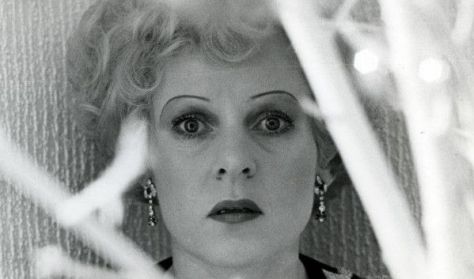
Veronika Voss (Die Sehnsucht der Veronika Voss, 1982) - Fates from the density of new German cinemab / Müpa Film Club
In German, with Hungarian subtitles.
The discussions before and after the screening will be conducted in Hungarian.

In German, with Hungarian subtitles.
The discussions before and after the screening will be conducted in Hungarian.
Ön egy múltbeli eseményre keresett rá. Kérjük, válogasson aktuális kínálatunkból a Jegy.hu keresőjében!
Last event date: Monday, June 05 2023 7:00PM
Müpa Film Club
Veronika Voss (Die Sehnsucht der Veronika Voss, 1982)
Fates from the density of new German cinema
Veronika Voss was Fassbinder's penultimate film and also the closing act in his BRD (Bundesrepublik Deutschland) trilogy. The trio of films also contains The Marriage of Maria Braun, and Lola. But what makes it a trilogy? The fact that all three films are set in the years following World War Two. An incredibly difficult time, as all adults had lived through the Nazi dictatorship, the war. It was in these years - and for much longer, too - that they had to face up to their absolute responsibility. That which happened, had not yet passed.
We are in Munich, 1955. Veronika Voss (Rosel Zech), a successful actress both before and during the war, cannot get a role. She has a questionable reputation. (Fassbinder took several elements for the character from the life of Sybille Schmitz, who was shunned by the acting profession due to her ties to Goebbels.) Frau Voss is a neurotic - and the hostage of her psychiatrist, who is bidding to rid her of her remaining wealth. The psychiatrist pumps her full of opiates and locks her away. The real hero of our story, however, is a sports journalist, Robert Krohn (Hilmar Thate), who has a chance meeting with Veronika. Perhaps he even falls for her a little. He begins investigating in the hope that he can save her, but is faced by people seeking to loot the wounded and losers of the war in organised though disparate ways. In some cases, they do not even shy away from murder. In the course of his investigation, the victims are revealed. Including the actress once loved by the regime, and the old lord, who reveals the numbers tattooed into his forearm when his sleeve rolls up. For this film, Fassbinder created a unique cinematic language. He shot it in black-and-white, as we see scenes from Veronika Voss's past and present merge into one. The cinematographer, Xaver Schwarzenberger, creates the kind of relationships between light and shadow that seem to enhance an actress who no longer finds her place in the world and transports her back to her glory years.
Director: Rainer Werner Fassbinder
Host: András Réz
Presented by: Müpa Budapest
A gödöllői Erzsébet királyné fénykert visszatér – még nagyobb, még fényesebb és még varázslatosabb, mint valaha.
A Hagyományok Háza állandó táncház-sorozatának a Hagyományok Háza Átriuma ad otthont, minden szombaton 21 óra és hajnal 2 között. Szombat esténként itt a helyed a Hagyományok Háza táncházában, tanuld és járd velünk a táncot!
Wolfgang Amadeus Mozart Die Zauberflöte (The Magic Flute) Singspiel in Hungarian and German with Hungarian, English, German subtitles
After years of tremendous success, on October 16, 2026, world-renowned violinist and conductor André Rieu will once again return to…
A káprázatos bohózatok mestere, Feydeau a végletekig fokozza a konfliktusokat. Szereplői ambiciózus, önző emberek, akik képtelenek tisztán látni. Hiúságuk felülkerekedik…
item(s) in basket
total:
Time limit has expired. Please, put item(s) in to basket again.